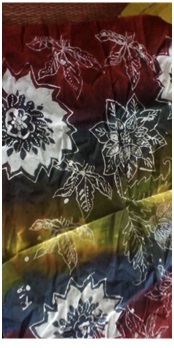Riau Andalan Pulp and Paper (RAPP), based in Jakarta, Indonesia, is a member of the APRIL group. RAPP believes in giving back to the community and holds various Community Development (CD) training programs throughout the year.
One of these training programs was on how to create batik. Batik is a complex form of decorating cloth by using wax and dye. Once a pattern has been designed and approved, wax is brushed or drawn onto selected areas before the cloth is dyed. The areas covered in wax resist the dye, remaining the original colour of the cloth before the wax was applied. The wax can be removed by soaking the cloth in hot water, after which the process can be repeated as many times as desired to complete the pattern.
Adhe Irmawani (32) and Marlina (27) were two of the 50 people to receive training in this craft through the Community Development program from RAPP. Through hard work, Irmawani become one of only six people to further her studies in Yogykarta, where she spent three days attending training and comparative studies in colouring batik motives, as well as further studies in Solo for staining techniques, and Pekalongan.
Both Irmawani and Marlina were housewives and stay at home mothers before the training, the only income for their families coming from their husbands’ work. Now, two years later, they can respectively earn up to Rp 1.5 million (US$ 115) and Rp 1.2 million (US$ 92) per month through their craft, creating a more stable financial situation for their families.
Another CD program recently hosted by RAPP was a month long sewing course for young men and women from villages in the areas surrounding RAPP operations. During the course attendees learnt the basic skills necessary to correctly take measurements, create patterns and sew completed garments. They were instructed in basic business skills so that they can either open a small business of their own, or join Rumah Batik Mainstay. After the course was completed each of the 15 participants received a 25% subsidy of the price of a sewing machine to help them get started in the business.
